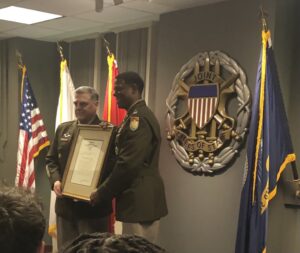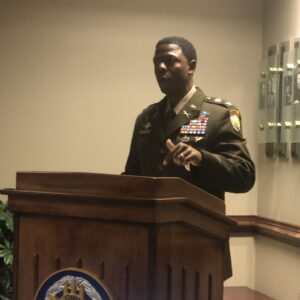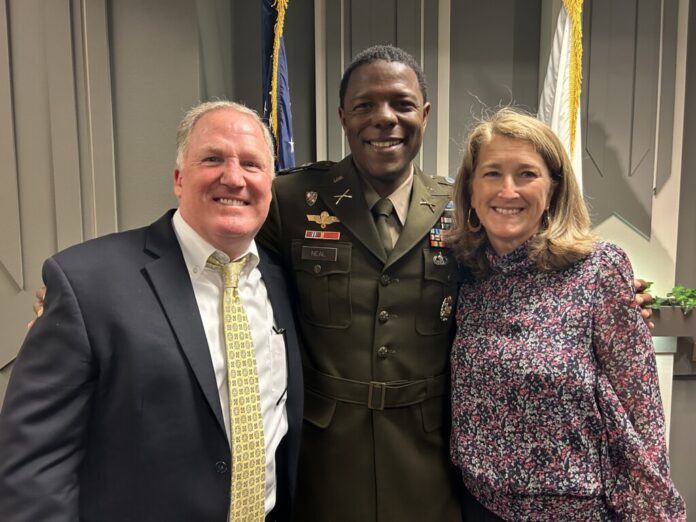“Embrace that experience that Jesuit is providing for you because on the backside of it, you are gonna be prepared for the challenges of life.” – Donald Neal ’97
Writing for The Roundup has gifted me with numerous opportunities to learn about my Jesuit brothers. Each experience has expanded my appreciation for the school and the connection between the Jesuit family. For example, I had an opportunity to speak to Lieutenant Colonel Donald Neal ’97 following his recent promotion in the United States military.
What does your current position entail?
My current position is the Deputy Executive Assistant to the Chairman of the Joint Chiefs of Staff. General Mark Milley, the Chairman, is the senior military advisor to the President. By nature of that, he also advises the Secretary of Defense and consults with members of Congress on the hill.
My job, as General Milley’s deputy executive assistant, is really to help with anything and everything that’s needed. But primarily, the essence of my job is to make sure that the material and the information that he needs to be successful is prepared and in his hands at the right time for the right meetings that he’s going to.
When you get a job like this, it’s meant to kind of broaden you and expose you to all the different services, the different leaders, and the different capabilities of all of the joint force that’s in our military. I’m hearing how big decisions are made so it’s a really neat experience for exposure to how our government works at the executive branch level.

How have your athletic experiences at Jesuit and Benedictine College shaped you as a man and a leader in our military and just in your job overall?
It’s funny because I talked to soldiers about it a lot. The first thing I’ll say is when you play sports whether you know it or not, you’re building this personal resilience to overcome adversity.
It’s not uncommon for any athlete whether it’s track, football, or basketball. You run a play, a design to be run in a certain way for it to be successful. If you don’t run it right in a practice, a coach is like, hey you screwed it up. Run it again. Usually not that pretty language, right?
You get used to getting direct feedback and taking it and internalizing it, then executing it. Trying to execute something to the way it’s designed, in itself alone just gives you the resilience to not dwell on it. If you’re gonna be a good athlete, you have to be able to take constructive criticism.
Coaches come in a million different flavors. Sometimes you have to cut through all of the noise and actually understand the message of the coaches, and that’s the kind of human experience as well in your own personal life and in your professional life. So I feel like the primary way football and all sports prepared me was just by building that resilience.
Another thing is anything you do when you get out of school and either join the workforce or play college sports is always going to involve other human beings. And you’re usually gonna be a part of the team, especially if you’re in the military. Everything you do is part of a team and being in team sports growing up in the formal years of my life, really taught me how to think about a higher purpose. This is to think about things other than myself.
You have a common goal, a common mission, and the team is required. Everybody has to do their job for the team to be successful. That really translates well into military life because we require so many different entities and so many different soldiers within the military.
Then you have to, as a leader particularly, be interested in what each person brings to the fight, how they can accomplish the mission, or how they help the team accomplish the mission. Then employing them in the right way so you get the most out of them to accomplish the mission.

Everybody in their life will face some type of adversity. This includes possibilities of losing a spouse, suffering from divorce, or getting laid off during a challenging time like now. Everybody is presented with these challenges and it’s how you handle those in the moment and how you take the experiences that you have. You build, you take feedback, maybe you reinvent yourself, and maybe you fine-tune yourself. You get back on the horse and you ride.
With sports, you lose on one Friday. You still got a game the next week. You got to shake it off. Then you have to flush that out by the time the next game shows up. You can’t dwell on the past. I think that’s a good analogy to the curve balls life will throw at you. Being a guy that’s played sports for so long, particularly football, you’ll find that it transfers into everything you do in your life.
What advice would you give to young men in general seeking to be leaders in their communities?
Jesuit does a great job of teaching their students to be men for others. When you leave, what you realize is, no matter what community you go to, no matter what school or what you do after you graduate, you know that people who make a difference in their communities, and in their workforces have one thing in common. They have this immense character and they put other people before themselves for the good of other people.
I think Jesuit just really gets it right when it comes to teaching the value of community service. When you leave Jesuit you’re really gonna miss doing that community service. A lot of guys I know that I graduated with have found ways to start giving back to their communities because it meant so much to them.
We’re taught to give and to sacrifice. We are taught to love other people for the sake of their well-being and not our own. That’s really what Jesuit teaches you. Learning this philosophy at Jesuit and kind of instilling that in who I am and the fiber of who I am as a human. This has helped me enormously as a man in my family.
How has your experience in your life, in the Army, and in your educational experiences taught you to be a man for others?
When you learn to be a man for others, you learn to pay attention to people and who they are at the fundamental level. What are their needs and what are their desires? What are their goals, their aspirations? If you care about people it makes you a better leader because all leaders have people that they work with and who work for them.
“The best leaders I’ve ever worked for are invested in their people’s futures. They want to know what their career goals are. They want to know about their families and how work is impacting their families.”
What I learned at Jesuit from being a Man for Others, was about caring and being connected to people on a deeper level than just a hello and a goodbye at school. That’s really what Jesuit is all about. It’s building this brotherhood for four years with the same group of folks.
I think what you learn from that is to care for people on a deeper level and it makes you a better leader. I had a Sergeant Major that used to say no one cares what you know until they know that you care.
Typically, if you’re the type of leader that cares about your men and their families, they’ll go anywhere for you. They’ll go to Hell and back with, and for you as long as you extend that kind of caring concern for them. Jesuit really solidified that for me and helped me take that forward into college and beyond.
I’ll give you a good example of a great leader. One reason that I wanted Coach Bob Wunderlick at my promotion is because he was a great leader. Coach Wunderlick completely changed the trajectory of my life because he cared.
I struggled academically in a lot of different classes and I was not a gifted student. He helped me find a tutor for math. I lived all the way in East Dallas, and he would come get me. A thing he didn’t have to do, well outside of his duties and descriptions as a teacher.
There were times when my mom couldn’t get me across town to North Dallas and he would take me to the tutor, and make sure that I did my homework and that I understood it, then he’d take me back.
The example of selflessness from Coach Wunderlick had an impact on my life and it was a model for me at an early age is what a good leader does.
Are there any lessons that you’ve learned throughout your career that might be applicable to the lives of current Jesuit students?
I told you I wasn’t a stellar student, I’m not being humble, I’m being honest. I struggled at Jesuit but one thing I can tell you is what Jesuit did for me. Aside from building that character and those leadership traits, they gave me the foundation of how to think critically.
You don’t appreciate it when you’re there, but Jesuit exposes you to all these different ideas. Even in faith from a Catholic institution. You’re studying what other people believe and why they believe it.
They teach you to think critically about the arguments and the concepts behind ideas, then they leave you to make some conclusions for yourself rather than trying to indoctrinate you on subjects.
I attribute a lot of my success to Jesuit because when you end up in the military, and it translates to anything, but when you’re in the military, oftentimes your ability to solve problems and your ability to solve the root cause of problems comes from being able to do critical analysis and critical thinking.
It’s a school where so many people from all over the Dallas area come. Not everybody Catholic, not everybody lives in North Dallas or in generally affluent areas. You get folks that are from all over and when Jesuit breaks down all of those different things about who you are we are all more alike than we are different. Everybody’s looking for an opportunity to succeed.
Jesuit exposed me to so many different types of people from different places that when I got into the world and I experienced that naturally I wasn’t overwhelmed by it. I wasn’t bothered by it and I wasn’t uncomfortable by it. I was used to the kind of diversity in the Jesuit community that exists in the world.
“People argue it’s not the most diverse. I think Jesuit is one of those experiences where what you put into it, is what you get out of it. If you take the time when you were there to know everybody and to try to understand everybody and where they come from and their experiences, I think you really benefit from it.”
What advice would you give to current students at Jesuit?
“Choose discomfort over comfort for the benefit of growth.” – Donald Neal ’97
The first thing I would tell you is the world that you’re gonna live in is somewhat uncertain. When we deal with uncertainty and adversity, it makes us uncomfortable. But when you’re uncomfortable, you’re usually growing.
If you choose situations that challenge you and stretch you mentally and maybe even physically, you’re gonna be uncomfortable. On the backside of it, you’re gonna be better. Your foxhole is gonna be wider and deeper.
That’s the point of your faith journey. That’s the point of your existence here on earth, which is to be better at the end than you were when you started. And I think that starts with Jesuit. You have a pretty rigorous curriculum. You’re exposed to things that you haven’t been exposed to. You’re in a place that really isn’t gonna let you take it that easy.
Embrace that experience that Jesuit is providing for you because, on the backside of it, you are gonna be prepared for the challenges of life and you’re gonna have this friend network, this brotherhood that honestly will carry through with you for the rest of your life.
The second thing I would tell you is to find an opportunity to serve. Whether it’s serving your community at the local level, whether it’s a stint of military service or some type of service for your community.
Find ways to give back because it’s those things that I think feed you spiritually and bring you joy. You can make all the money in the world and that’s not gonna bring you joy. But I do think seeing people’s lives improve because of something that you’ve done is really what the Christian experience is supposed to be about.
The last thing I’d say too is to have fun. You’re taking the SATs and the ACTs, you’re starting to stress about colleges and what college I’m gonna go to. And you have the weight of the world on you because you’re saying to yourself, whatever I choose and wherever I go is going to determine my future. That’s not false. But I will tell you the thing to really cherish is the time being at Jesuit. Where you have this brotherhood.
Enjoy being able to go to a football game or support your peers at a soccer game. Enjoy going out and having fun and doing those things. Because you got about four more years of that in college and it won’t be with your Jesuit brothers. You’re gonna be spread all over the world.
The Jesuit years are some of the best years of your life. They were for me. Sometimes you’re stressing about your GPA and all those other things.
“Just take a deep breath relax and know that Jesuit is preparing the total you and not just the academic you.”
Conclusion
Donald Neal ’97 truly exemplifies the best of our community through his focus on selfless leadership and bravery. After only a few moments during my conversation with Lt. Colonel Neal, I felt a massive connection through our shared experiences as Jesuit brothers. Neal frequently spoke on principles preached throughout his time at Jesuit, which parallel similar themes of my own experiences here.
This conversation provided a perspective of how vital this education has been in my life and allowed me to really appreciate the education I’m receiving. My hope for the Jesuit community is to heed the advice of this distinguished alumni and extremely accomplished Ranger, allowing us all to learn from his experiences.
Finally, our conversation ended with Lt. Colonel Neal saying, “by virtue of you being at Jesuit and a future graduate, we are brothers.” These words stuck with me, as they represent the connection between all members of the Jesuit community no matter the graduation class or status.
I’d also like to thank Coach Wunderlick and Dr. Degen for providing the opportunity to speak to Lt. Colonel Neal. This was an extremely memorable experience that has allowed me to learn from a fellow Jesuit brother.
Stay tuned to The Roundup for more news on alumni and other student matters.
*Anthony Nguyen ’24 and Peter Loh ’24 contributed to the creation of questions.






